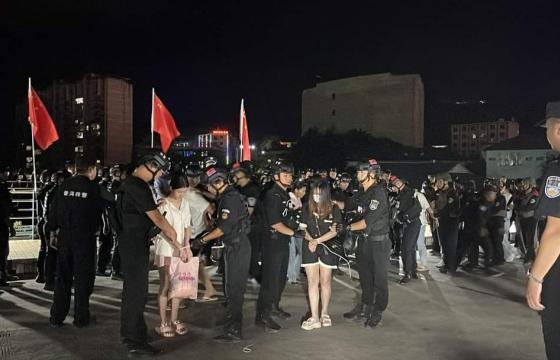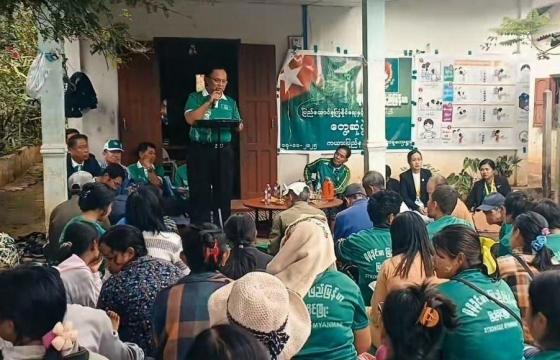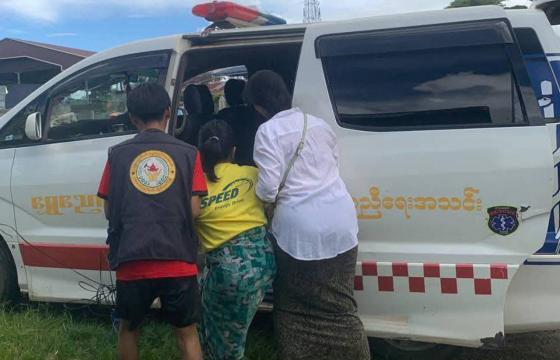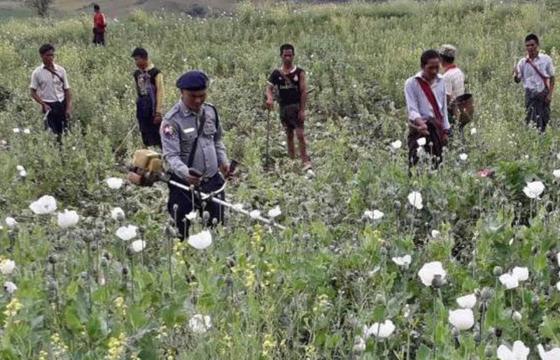Sai Wansai — On May 27, presidential office issued an announcement signed by President Win Myint the formation of a Covid-19 prevention and coordination committee to cooperate with ethnic armed organizations (EAOs).
The committee is chaired by Dr Tin Myo Win, the National Reconciliation and Peace Center (NRPC) vice-chairman; the committee’s vice-chairman is retired Lt-Gen Khin Zaw Oo, who is the secretary of the peace commission (PC); the secretary is Hla Maw Oo, who is the deputy minister of Ethnic Affairs Ministry; and committee member, Moe Zaw Oo, the advisor to the PC.
According to the announcement the coordination committee will monitor returnees at the country’s official border crossings, exchange information with the EAOs about suspected patients with coronavirus infections and information about their medical treatment, and coordinate treatment of the patients.
Moreover, the committee would abide by the NRPC guidelines in handling emergencies in areas controlled by EAOs, including coordination and cooperation among ethnic armed groups, regional and state governments in the fight against the epidemic.
The main message of the statement is that “No one left behind policy,” which has been welcome by the EAOs in general.
EAOs’ response
While the government’s Covid-19 prevention committee finds affirmative response by many EAOs, others are quite sceptical.
A signatory of nationwide ceasefire agreement (NCA), Restoration Council of Shan State (RCSS) advisor Khuensai regarding the committee formation told the Karen Information Center (KIC): “I asked concerned people of the RCSS and they said they welcomed it. And on April 17, the EAOs that signed the NCA held a meeting and agreed to form a committee to work jointly together on Covid-19 (with the government’s committee). At the moment we have already informed the Peace Process Steering Team (PPST) leaders (for approval). The formation should follow soon. After that cooperation will be carried out by all means.”
In mid-April Burma Army or Tatmadaw attacked a team RCSS medics who were carrying out Covid-19 awareness activities in southern Shan State’s Mongpan Township and later told the villagers not to accept personal protective equipment (PPE), or else they would face arrest. However Khuensai said that it is now resolved and he thought it was only an act of some old hand, with old thinking, in an area within the Tatmadaw.
Karen National Union (KNU) Joint-Secretary Padoh Saw Hser Pwe similarly told the KIC: “The formation (of the committee) for the prevention (of virus) has to be welcomed. But regarding the cooperation we will have to wait and see in which form we will adjust, cooperate, agree and implement.”
Just like the RCSS, KNU also faced the same obstacle when it was carrying out its awareness-building and prevention measures on Covid-19, in its Brigade 1 adjacent to government controlled area. Karen State border affairs security ministry office sent letter to KNU that it should only act according to the NCA and not to interrupt in the administration of Karen State. The problem was already resolved as the KNU withdraw from the disputed area.
But some members of the Shan community expressed doubt about whether the EAOs and the government can cooperate to curb the spread of Covid-19, suggesting it would be better for the government to allow the EAOs manage disease prevention in their own areas, according to Network Media Group recent report.
Shan Nationalities League for Democracy (SNLD) Joint-Secretary (1) Sai Kyaw Nyunt said: “We welcome the formation of the committee. But it should be workable. It has to be formed with a mechanism that is able to function. If it only for the name sake, it is useless. I just want to say that implementation is more important.”
A Shan youth political activist, Sai Naw Hseng pointed out: “(EAOs) working in their own space could deliver into the hands of the people (locals).”
“The main thing is that the NCA-non-signatory EAOs should be entitled to act in their own territories. So far as we know they are trying to do things (Covid-19 prevention and awareness-building) as much as they can. So I believe if there is no disruption it will be beneficial for the people. From the outset because the people accepted them they have their own territories and have been engaged in the movement. Whatever it is they are serving the people,” he said.
“Finding fault and stirring up armed conflict as is the case now, including forming committee which has no transparency won’t be able to deliver and cannot be trusted,” he added.
The signatory EAOs recently made known that they expect the government help in combating Covid-19.
The presidential announcement doesn’t mention anything regarding cooperation with the non-signatory EAOs.
Situation in EAOs’ areas
There are some 20 EAOs of which them 10 are NCA signatories and 10 non-signatories.
Beginning March the KNU, RCSS, United Wa State Army (UWSA), Mongla or National Democratic Alliance Army (NDAA) and Kachin Independence Army (KIA) have been conducting health checks and awareness-building on Covid-19 pandemic in Karen, Shan and Kachin states respectively. Given that the EAOs are based along the borders with Thailand and China, they have already played a key role in contributing healthcare awareness to migrant returnees.
Of the non-signatories, the UWSA and Mongla are economically well off, including KIA which is bit less affluent that the former mentioned two but a lot better than the rest EAOs.
The three said EAOs have sizeable administrative territories, troops and populated towns and villages with sizeable population, including economic structure to fund their administrations. Thus where the handling of Covid-19 is concerned they are better off than the others.
For example, the UWSA, NDAA and KIA have modern hospitals in Panghsang, Mongla and Laiza respectively, with trained healthcare providers and are in a position to accommodate a certain amount of patients should there be a Covid-19 outbreak. Luckily until now this has been not the case.
The NDAA (population: 150,000) and UWSA (population: 600,000) have been on alert starting from January, way ahead of Myanmar government, and since then have been active in public awareness-building and prevention on Covid-19. By March both have sealed off their territories to prevent the spread of the virus. Both work closely with China and could depend on China should there be serious cases that are life-threatening.
The KIA, even though it has a hospital is said to be short of protective gears and necessary medical equipments. It said it will also have to depend on China for in serious cases. But luckily until now there has been no infection among thousands of its troops, civilians and some 70,000 internally displaced persons population under its jurisdiction.
The non-signatory Shan State Progress Party has being educating the locals on virus prevention and spraying disinfectant in its controlled area since two months. It is said to receive over 100 PPE, tons of disinfectant, 5000 disposal face masks and hand gloves from the UWSA, whose territory is adjacent to the SSPP.
The non-signatory Ta’ang National Liberation Army said the armed clashes have de-escalated in northern Shan State and the Three Brotherhood Alliance, which it is a member together with the Arakan Army and Kokang, have made an extension of its unilateral ceasefire from May 3 to 30, so that the Covid-19 could be dealt with more effectively.
“We have 33 camps. About 260 are quarantined and 132 were already released to go home as they have fulfilled the time needed to be quarantined. Only about 130 remain,” said the TNLA to the media.
The RCSS and as well the SSPP have hinted that they need government help to feed over a thousand people returnees from abroad in the former and 5000 in the latter territories, who have to be quarantined before releasing them back home. So far at this writing, nothing concrete has been reported concerning food and material aids from the government.
But sadly unlike northern Shan State the war in Arakan rages on despite Covid-19 pandemic.
Legitimacy question of EAOs
Given such scenarios in the midst of Covid-19 pandemic, it is hard to imagine how the future is going to unfold, especially the relationship between the government and the EAOs.
On the positive side, if the government is going to yield to the call for financial and material aids to the signatory and as well to non-signatory EAOs it would at least mean a partial recognition of their legitimate existence.
Maybe the government should take the opportunity of this Covid-19 prevention cooperation venue to energize the stagnated peace process and stimulate trust-building and eventual reconciliation.









